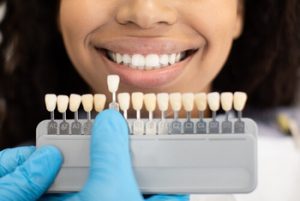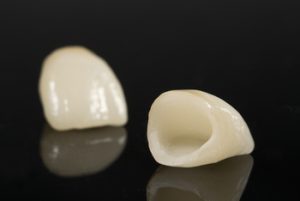Dental veneers, often perceived primarily as a cosmetic solution, offer a transformative change for those seeking a flawless smile. These thin covers, tailored to fit the surface of teeth, address various aesthetic concerns such as discolouration, chipped or broken teeth, and gaps. Beyond their visual appeal, veneers may also have protective qualities. This post explores an important question: do veneers protect your teeth?
Understanding Veneers
Definition and Types of Veneers
Veneers are custom-fitted shells crafted to cover the front surface of teeth, significantly enhancing their appearance. Porcelain and composite resin are the two main materials used for tooth veneers, each offering distinct advantages.

Composite veneers, while more cost-effective, offer a quicker solution as they can often be fabricated and applied in a single visit. Though they are less durable than their porcelain counterparts, composite veneers are easier to repair and adjust, which can be advantageous for patients looking for a more flexible option. Both porcelain and composite resin veneers are tailored to fit snugly over damaged or weakened teeth, providing not only an aesthetic enhancement but also a protective cover that can help prevent further wear and deterioration.
Application Process
The process of applying veneers is meticulous and begins with a consultation where the cosmetic dentist evaluates the suitability of veneers for your specific dental needs. During this initial stage, the dentist will remove a minimal amount of tooth enamel—typically less than a millimetre. This step is crucial as it facilitates a flush fit of the veneers against the natural contour of your teeth, ensuring the veneers blend seamlessly with your natural smile while maintaining the functionality of your bite.
After the enamel is removed, a detailed impression of your teeth is taken. This impression is critical as it will be used to custom-create your veneers in a dental lab. This custom fabrication ensures that whether you choose porcelain or composite resin, your veneers will be perfectly matched to the colour and shape of your existing teeth. While waiting for the permanent veneers to be crafted, temporary veneers are often placed to protect the prepared teeth. These temporaries provide a preview of the expected outcome and help maintain the aesthetics and functionality of your teeth.
The final bonding process is precise, involving a thorough cleaning of your teeth to ensure a secure and lasting bond. The veneers are then meticulously placed, adjusted, and finally bonded to the teeth using a special adhesive, which is hardened with a light beam, ensuring they are securely attached and ready for immediate use.
Reasons for Choosing Veneers
Choosing veneers can dramatically improve the appearance of one’s smile, especially for individuals with discoloured, damaged, or weakened teeth. They are an excellent option for those whose teeth might not respond well to traditional whitening methods. By covering the external surfaces, veneers provide a brighter and more even smile, effectively addressing severe discolouration.
Furthermore, for teeth that are chipped, cracked, or uneven, veneers offer a substantial cosmetic improvement by covering any imperfections and providing strength to the damaged or weakened teeth. This aspect is particularly important for those who may have experienced enamel loss either due to an injury or decay. Veneers not only restore the appearance of such teeth but also their functionality, offering an added layer of protection against future damage.
In cases of minor misalignments or gaps between teeth, veneers serve as an alternative to orthodontic procedures. They can be designed to close gaps or correct alignments, which might otherwise require braces or other orthodontic solutions. This capability to customise makes veneers a versatile and appealing option for many seeking cosmetic dental improvements.
By choosing veneers, patients benefit from a quick transformation with durable results, improving both their smile’s aesthetics and the overall functionality of their teeth.
Protective Qualities of Veneers
- Strength and Durability. Veneers fortify your teeth by providing a robust layer over your natural enamel. They are built to withstand normal chewing forces, reducing wear and protecting against further damage to weakened teeth. Porcelain veneers, in particular, are highly resistant to wear and can help prevent further erosion of tooth enamel.
- Coverage and Shield. By covering the front surface of the teeth, veneers act as a shield for the underlying teeth. This coverage helps protect against external factors that can lead to tooth decay. However, it’s crucial to maintain good oral health habits as veneers do not protect against decay that can occur on unprotected parts of the tooth.
Limitations
While veneers offer some protection, they are not a cure-all. They do not protect against gum disease, and cavities can still form at the gum line or between the teeth. Veneers also require enamel removal, which can weaken natural teeth, making them somewhat more vulnerable if the veneers are damaged or removed.
Maintenance and Care for Veneers
Caring for Your Veneers
To ensure that veneers protect your teeth over time, adhering to proper care guidelines is crucial. It’s recommended to use non-abrasive fluoride toothpaste and a delicate toothbrush to clean your veneers gently. This helps maintain their polish and prevent scratches on their surface. Additionally, it’s important to be mindful of the foods you eat; avoid biting into very hard foods like ice, hard candies, or nuts, which can cause your dental veneers to chip or crack. Instead, cut hard foods into smaller pieces to protect your veneers from undue pressure.
Maintaining good oral health habits is essential not only for the longevity of your veneers but also for the health of your underlying teeth and gums. Ensure to floss daily, as veneers require careful cleaning around the gum line to prevent plaque buildup, which can lead to gum disease. Rinse with an alcohol-free mouthwash to keep your mouth fresh and to reduce the accumulation of harmful bacteria.
Regular Dental Check-Ups

Your dentist can also provide professional advice on how to care for your veneers based on their condition and your personal habits. Regular assessments may include reviewing your dental care techniques and ensuring you are using the correct motions to avoid damaging your veneers during daily cleaning.
Mitigating Risks
To further protect your veneers, consider wearing mouthguards during sports or if you grind your teeth at night (bruxism). These guards help absorb shock and reduce the risk of veneer damage during physical activity or from grinding. Addressing other habits that might compromise the integrity of your veneers, such as nail-biting or chewing on hard objects, is also crucial. Such habits can exert excessive force on your veneers, leading to chips or cracks.
Additionally, avoid using teeth whitening products that are not approved by your dentist, as some chemicals might damage the glaze of your veneers. Instead, consult with your dental care provider about safe products for maintaining the brightness of your veneers.
Educate yourself on the signs of veneer damage, such as slight movements of the veneer, changes in fit, or increased sensitivity in the veneered tooth. Detecting these indicators early can prevent more severe damage and ensure timely interventions.
By following these comprehensive care guidelines, you can maintain the aesthetic appeal and protective functionality of your veneers for many years. These steps not only help in extending the lifespan of your veneers but also contribute to overall good oral health, ensuring that your investment in your smile is well protected.
Discover the Protective Power of Veneers at Infinity Dental Care

The decision to opt for veneers should be carefully considered based on your specific dental needs and the current health of your natural teeth. At Infinity Dental Care, we believe in a personalised approach to dental care, ensuring that each treatment aligns perfectly with your unique dental requirements and aesthetic goals.
If you’re pondering whether veneers are the right choice for you, we encourage you to reach out to us. Contact Infinity Dental Care at (02) 9159 6237 to schedule a consultation with our dental crew.
References
https://www.medicalnewstoday.com/articles/dental-veneers
https://www.colgate.com/en-us/oral-health/veneers/dental-veneers-pros-and-cons
